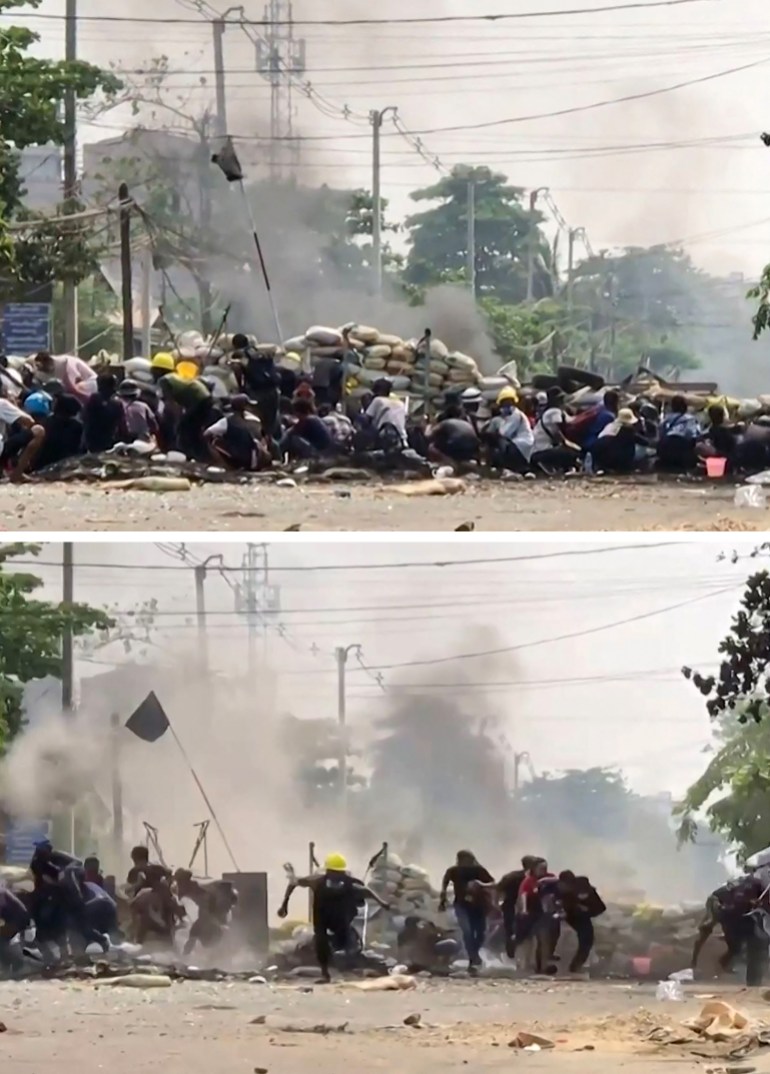Myanmar: Five protesters explain why they will not give up
More than 500 have died, but protesters say they must continue fight to avoid a return to Myanmar’s dark past.
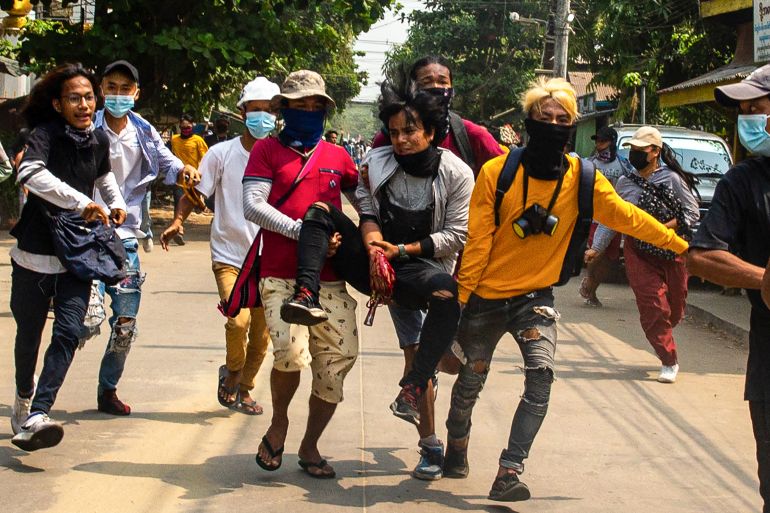
Hundreds of people have been killed in Myanmar amid an increasingly violent response to continuing protests calling on the military to step down and restore democracy.
The Assistance Association for Political Prisoners, an advocacy group tracking deaths and detentions, says 510 people have been killed in the violence with Saturday marking the bloodiest day since the military seized power in a coup on February 1.
Keep reading
list of 4 itemsIn Pictures: Myanmar protests continue after more than 100 killed
Dr Sasa: Army leaders ‘underestimate’ the people of Myanmar
‘Day of shame’: Dozens of anti-coup protesters killed in Myanmar
Analysts doubt the brutality of the crackdown by the military, also known as the Tatmadaw, will deter the protesters.
“Incredibly, although the Civil Disobedience Movement (CDM) comprises unarmed protesters with their flimsy homemade tin shields and hats, they have been able to deny the ‘mighty’ Tatmadaw the things they most crave: control over the country and economic stability,” said Gwen Robinson, a senior fellow at Chulalongkorn University’s Institute of Security and International Studies in Bangkok, and editor-at-large at the Nikkei Asian Review.
“By sheer force of their spirit and bravery they have foiled the generals, and to me that is a significant victory.”
Myanmar has a population of 54 million with about a third from ethnic minorities.
The military has begun bombing in eastern Karen state, which has sent thousands fleeing into neighbouring Thailand. On Tuesday, three ethnic armed groups including Rakhine State’s Arakan Army released a statement demanding the military stop the killings of civilians.
Robinson believes the coup has helped unite the country against the military.
“You have got big business, civil society, ethnic groups, different religious people all against the coup – that is an extraordinary thing,” she said.
With Robinson warning that Myanmar could end up a failed state with a brutal dictatorship holding onto power through sheer force, Al Jazeera spoke to five protesters about why they have taken to the streets and what might happen next.
The front-line protester
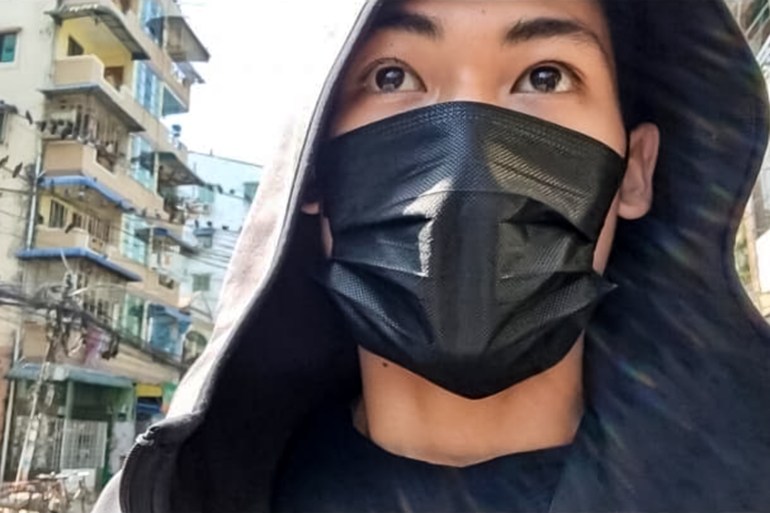
“Fox” said he and his group demonstrated peacefully until the military started killing their friends: “That’s when we decided we would fight back”. The 20-year-old is part of a group of front-line protesters, with the youngest only at 15.
“I’m making all the decisions, it’s a lot of responsibility, especially when I have these kids, but they’re good kids, we’re a good team and doing good so far.”
The group has experienced a lot in the last few weeks of protest and was forced to run for their lives from military bullets, after soldiers shot directly at them.
One of Fox’s roles was to help build sandbag barricades but the security forces used brutal tactics to get rid of them.
“They took hostages,” he said. “They pointed guns at people who are walking around these defence lines and took them hostage. And because they have these hostages, people in the neighbourhood don’t attack the military any more because they don’t want to harm innocent people.”
Now the group is in hiding – after a fellow protester was arrested and his phone seized. Fox and his group’s names were in it, along with many others.
“They got his phone, and they tracked other front liners with the information they have from that, and that guy that got arrested died in custody. They killed him in custody, they tortured him.”
This is how Myanmar protestors bravely defend themselves with firework sticks, slingshots from inhumane terrorists with live ammunitions.
Location – Ahlone township
– Myanmar labour news#WhatsHappeningInMyanmar#Mar18Coup pic.twitter.com/3ohfmB4iBY— pyaezone (@pyaezone) March 18, 2021
Al Jazeera was not able to independently verify the death, but Fox sees the protester’s murder as a warning from the military that, “this is what is going to happen to you if you keep doing this”.
Last week, as the military hunted the group, they escaped Yangon by bus. The vehicle was stopped by the police eight times during the trip to a safe house but none of the group was identified.
“Everyone is scared of being hurt or being killed, but at the same time it’s scarier to think about what the military would do if they win this, and that’s what the older generation don’t get at the moment,” he said.
“They keep saying: ‘No don’t go out now it’s dangerous’, but if we don’t go out now and fight for this, it’s going to be dangerous for the rest of our lives.”
The organiser
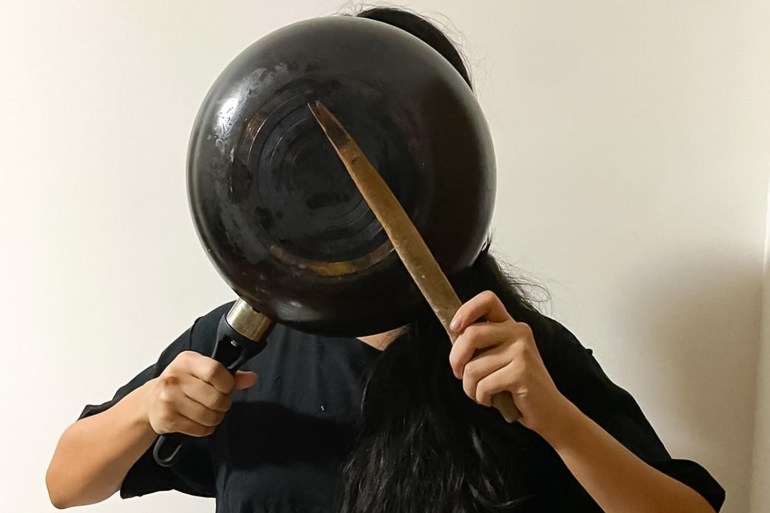
Thet says she supports the CDM with online activism, her popular Instagram account and spying on the military.
“I collect, condense and share information. I have a bike and I go scouting early in the morning to identify what the military’s movement patterns are and what townships will be hit hardest.”
Thet also assigned herself the task of keeping count of those killed by the military, known in Myanmar as Tatmadaw, and their personal details, but the rising toll has come at a cost.
“For me, the deaths blur together because the circumstances are the same. I feel quite empty, very hollow. I feel like there are bees in my head buzzing all the time. I don’t know what life was like before the buzzing started. Maybe it started when they killed those people way back in February in Mandalay.”
She says she has also been searching for protesters who have disappeared.
“Staff in local jails – at risk to their lives – sometimes pass on information about arrested protesters,” she told Al Jazeera.
The activist, who is in her 20s, says she has built a network of connections to find safe houses for protest leaders forced into hiding.
“The ones I have worked with have not been caught, and I hope it stays that way.”
Thet says she admires protesters’ creativity and the humour of the civil disobedience movement: “I have an immense love and respect for our citizens, there are some ways in which I think our country is full of loveable comedians who are trying to bring life into everything they are doing.
“We have a popular banner which is very Burmese: ‘We will win, maybe not immediately, but definitely we will win’.”
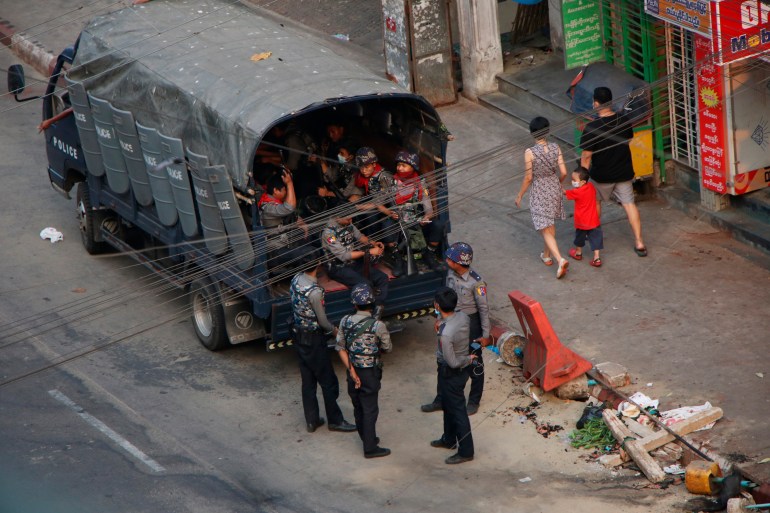
Amid the escalating violence, protesters have been writing “death letters” to their family and the public to encourage people to continue resisting the generals, according to Thet.
Traditionally, mourners offer food to the Buddha and monks when someone dies so their spirit can be at peace but the anti-coup protesters want things done differently if they are killed.
“They write: ‘Don’t do that, even in death I will still be by your side until you win. Please do not donate food, I still want to stay and fight. I will not move on until we’ve won’.”
Thet also has written her own letter and told those she trusts where they can find it.
“A lot of my letter is a request to protect my body,” she said. “I want to donate my organs to someone who needs them, not for them to fall into the hands of the military who will just sell them for their selfish reasons.”
The pastor
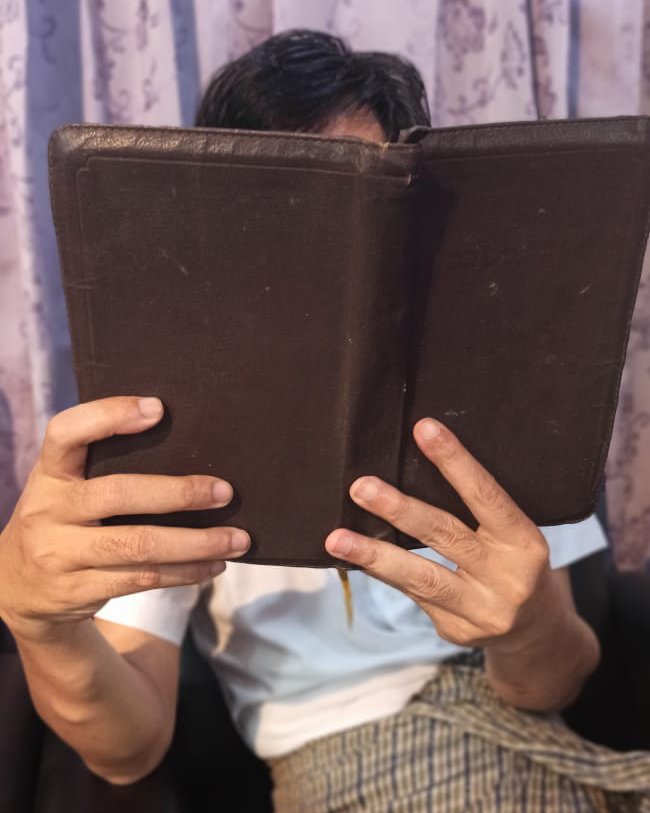
U Man, a pastor leading a congregation in Yangon, says that as well as providing spiritual support to protesters he has driven them to demonstrations, given money to their families and raised funds to buy protective equipment such as gas masks and helmets.
As a teenager, U Man took part in the 1988 uprising, before the military crushed all dissent, leaving thousands of people dead.
The pastor, who is in his 50s, does not believe the military’s strategy has changed since then.
Both then and now, he says the military inserts a “dalan”, an infiltrator, into the crowd to provoke the Tatmadaw and set up a conflict.
He has advised his son, who has also joined the protests, and others, not to engage with the security forces and to identify the infiltrator through a simple three part instruction that he hopes will save lives: “Don’t engage with the military. Find out who the dalan is. Don’t let the dalan control the narrative.”
“Being a minister of the Christian faith, I don’t want to recommend anyone using violence,” he said. “I know people who have been beaten. It’s very difficult for me because I have all these feelings of anger and anguish, and if I had a weapon, I would use it against them. That makes me feel shame because I am a pastor,” he said.
U Man says he prays with his children and protesters before they go out into the streets.
“I teach protesters and my congregation about the Bible and those people in it who experienced challenges, the mindset they had to overcome them, and how God is able to save them,” he said.
The teacher
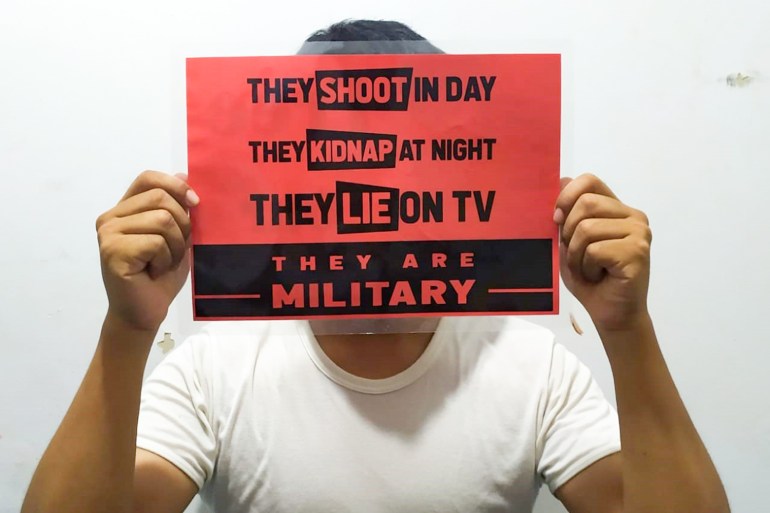
“I have been tear-gassed. A lot of my friends were shot by rubber bullets,” Aung Myo Zaw told Al Jazeera.
The 32-year-old teacher says he is afraid of getting shot while protesting, but people were coming up with different tactics to keep the spirit of resistance alive, creating “protest posters and strategies where we protest for one hour and then disappear quickly”.
“I was inspired by the bravery of the people and the spirit of defiance, that gave me courage. It is a strange feeling to be scared and hopeful at the same time.”
“With 80 percent of staff out doing CDM and only 20 percent still working, the military cannot run the country any more. The system is not functioning,” Aung Myo Zaw said.
The doctor
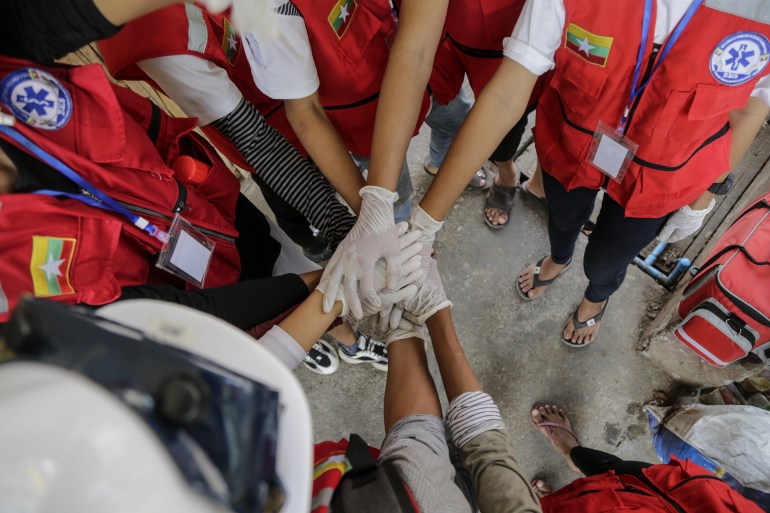
On February 2, the day after the coup, medical workers and civil servants founded the CDM.
Thiha Tun, who is in his 30s, joined the same day.
“I became part of a medical cover team providing first aid to protesters,” Thiha Tun told Al Jazeera. “There were many kinds of injuries, from bruises, cuts and lacerations through to penetrating wounds. These injuries were caused by batons, rubber bullets and live ammunition.”
“They shot and beat the medics and ambulances, shot at the private hospitals, occupied the public hospitals, raided the charity clinics and detained the medics in the field.”
Now it has become too dangerous.
“Most of us are on the run these days,” he said. “They were searching for the leaders and activists. The junta’s forces traced the addresses using photos of the doctors. So, we can’t stay at our permanent addresses.”
Thiha Tun, who did not share a photograph of himself for fear of reprisals, says the situation will only get worse.
“A civil war is coming soon,” he predicted. “A federal army will be formed with the ethnic armed forces first and will be joined by the citizens later.
“The doctors and nurses will take care of the wounded as we’re now learning trauma care techniques online.
“I really don’t want my beautiful country destroyed by war, but I don’t think we can avoid it as the junta didn’t give us a choice. They won’t back off to release the power and we won’t give up till the legitimate government returns to form a federal, democratic country.”
Follow Laura Bootham on Twitter at @LauraBootham
